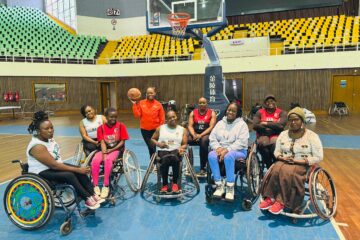Catherine, a vibrant business owner and peer-to-peer motivation trainer in Nairobi, has lived as a paraplegic for 17 years. Her journey with disability began suddenly in 2007 when she was just a teenager. One afternoon, she was in the family garden, gathering vegetables. As she bent down, a sharp pain struck her back, and in an instant, her legs went numb. She collapsed to the ground, unable to move her lower body. Her voice was gone too—no screams, no calls for help. It was a terrifying moment. When her father found her, she was quickly rushed to Kenyatta National Hospital.
A week later, after an MRI, doctors delivered the news: Catherine had transverse myelitis, a rare neurological disorder that causes inflammation of the spinal cord, disrupting the nerve signals between the brain and the body. It can happen suddenly, as it did for Catherine. One moment, she was simply gathering vegetables, and the next, her world turned upside down. The diagnosis shattered her world—doctors told her that her paralysis was permanent. Like any teenager, she expected to be treated, given medication, and sent home to continue her life. But life had other plans. Instead of a quick recovery, Catherine spent six to seven months in the hospital. The reality that her condition was irreversible hit hard.
Her time in the hospital brought its own set of struggles. She developed pressure sores from long hours lying still, her frustration growing with each passing day. And when she finally returned home, life was no easier. Her house was not accessible, and for the next eight years, Catherine was confined to her bed, feeling trapped and helpless. Her parents had to work, and with no support systems in place, Catherine’s world became even smaller, filled with isolation and despair.
But then, one day, everything changed. A friend of her mother told her about wheelchair users playing tennis. Catherine, skeptical at first, couldn’t believe it—wheelchairs and sports seemed an unlikely pair. Yet something inside her shifted, and she decided to see for herself. What she saw surprised her—people with disabilities, alive and energetic, playing tennis. It was the first time Catherine saw that life in a wheelchair wasn’t the end. Among the athletes, she met a stylish, confident woman in a wheelchair, and that encounter sparked something within her. For the first time, Catherine believed her life could be different.

Catherine participating in a marathon.
From there, her journey took a positive turn. Catherine participated in the Stanchart Marathon with fellow wheelchair users and felt alive for the first time in years. Then, she met Nancy from Motivation Charitable Trust, who introduced her to a five-day peer-to-peer training program. During the program, Catherine learned the skills needed to live independently as a paraplegic. To her surprise, many of the trainers were also wheelchair users who were thriving. One trainer, a woman from Tanzania, had a child despite her disability. The idea that Catherine, too, could have a family, a career, and a fulfilling life felt like a revelation.
With this newfound knowledge, Catherine’s life began to transform. She started her own business and participated fully in sports. In 2017, she attended another Motivation training session, and her transformation stunned everyone. She was no longer the isolated woman from a year before. She was now a business owner, a sports enthusiast, and, to her own surprise, pregnant. It was something she had once thought impossible.
Now, as a peer-to-peer trainer, Catherine gives back to the community that gave her hope. She visits schools, supports adults with disabilities, and helps others discover their own paths to independence. Her journey—from isolation and despair to empowerment and independence—is a testament to the resilience of the human spirit.

A New Chapter: Catherine’s Triumph Over Transverse Myelitis
“This is just a wheelchair, not an end to life,” Catherine now says. What once felt like an insurmountable obstacle became a stepping stone to finding her passion. Through sports, business, and peer-to-peer training, she realized that purpose can come from the most unexpected places. Independence and fulfillment aren’t tied to walking—they come from moving forward with determination.
Catherine believes that anyone can find their own light, no matter the challenges they face. Her message is simple: “Find your passion, and pursue it with everything you’ve got. The wheelchair doesn’t limit your spirit—it just changes the way you move. Life can be full, rich, and meaningful. You’re still you, with your dreams, your talents, and your strengths.”

Catherine enjoying life.
To someone who has just been told they will never walk again, Catherine offers heartfelt advice: “I know it feels like the end, but it’s not. I’ve been there, in that dark place, feeling like life is over. But believe me, it’s just the beginning of a new chapter. Take things one step at a time, even if those steps aren’t physical. Surround yourself with people who inspire and uplift you. Don’t be afraid to ask for help—it’s not a sign of weakness, but of strength. Most importantly, don’t give up on your dreams. Your journey might look different now, but it can still be beautiful and filled with purpose.”
Catherine’s story is a powerful reminder that even in the darkest moments, there is light waiting to be found. All it takes is the courage to seek it, the determination to embrace it, and the belief that life—no matter the circumstances—holds endless possibilities.



7 Comments
Sav · September 6, 2024 at 9:56 am
I can read this over n over again. Quite encouraging
There is always light at the end of the tunnel
Wonderful piece!!!
Keep doing this
Tito · September 6, 2024 at 11:52 am
Beuryfuuu👏❣️🥳….fr. nothing is (insurmountable) ni mindset tu.
Duncan Onyango · September 10, 2024 at 4:12 am
Indeed my fellow pwds are winning….. I’m immensely moved, keep the spirit burning 🔥.
www.xmc.pl · May 2, 2025 at 11:55 am
This piece is a quiet symphony of thought — its rhythms are soothing, but its meaning is profound.
THC gummies · July 15, 2025 at 12:31 am
Good shout.
Peer-to-Peer Training: A Lifeline for Spinal Cord Injury Survivors in Kenya - Unbroken Steps · September 19, 2024 at 7:59 am
[…] where people with lived experiences of spinal cord injury (SCI) guide others who are newly injured. These trainers—people who understand the unique challenges of SCI—offer emotional support, practical advice, […]
Disability is an Inability: A Hard Truth Society Avoids - Unbroken Steps · February 10, 2025 at 8:56 am
[…] other day, I was traveling with a friend—a fellow paraplegic. As we were boarding a cab, there was a bit of a struggle. The car was higher than I was used to, […]